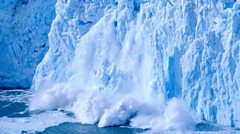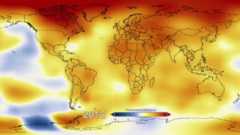



RTL
Got a TV License?
You need one to watch live TV on any channel or device, and BBC programs on i Player. It’s the law.
By Frances Mao, Jay Savage and Andreas Illmer
All times stated are UK
-
Pacific islands ‘not drowning but fighting’
We’re heading into late afternoon across the Pacific, where protests have been taking place in small island nations including Vanuatu, the Solomon Islands, Kiribati, and the French territory of New Caledonia. These are countries facing the very real risk of being swamped by rising seas as the climate warms.
Images and video clips being posted online show people in different locations chanting “we are not drowning – we are fighting”, or variations of the same message.
And if you’re wondering what’s happening in New Zealand – its strikes will not take place until next Friday.
-
Great big worries about the Great Barrier Reef
Back to Australia now, where the ravages of climate change can be seen very clearly at the Great Barrier Reef – one of the world’s most diverse ecosystems .
Half of the reef’s coral is dead andthe system is struggling to grow new ones, scientists say.
Warming waters pose the greatest threat. Three years ago, they caused “mass bleaching events” which not only “cooked” the coral, but also destroyed habitats for other sea life.
- Australia downgrades Great Barrier Reef outlook to “very poor”
- Can science and tourism save the reef?
The UN classified the reef as a World Heritage site in 1981 for its “enormous scientific and intrinsic importance”, but is now considering adding it their list of sites which are “in danger”.
Video content
Video caption: Rising sea temperatures have wreaked havoc -
South East Asia’s choking haze
If South East Asia needed a reminder that environmental damage is real , the region is currently experiencing its worst “haze” in years. What’s the haze? It’s thick, yellow, burnt air – terribly unhealthy – that comes from illegal fires.
Looking out from the window of our BBC office in Singapore, today’s sky looks clear enough, but for most of the past week it’s been barely visible. Just have a look at this shot of the towers of the Marina Bay Sands hotel just two days ago.
Copyright: AFP
The Singapore F1 takes place this weekend, so we’ve beentaking a look at how much the haze could affect that major tourism event.
Things are much worse in neighboring Indonesia and Malaysia, though, where schools are closed and serious health warnings are being issued.
This is what the air looks like in Palangkaraya in Kalimantan, Indonesia’s part of Borneo, this week.This dense brown air is the result of the largescale burning of forests and peatland for farming.
Millions of people are living with air frequently measured as hazardous to health. Palm oil and paper production have brought much-needed income to many poorer areas of South East Asia, but many people are starting to ask whether this is an acceptable pay-off.
Video content
Video caption: Flying through Indonesia’s choking haze -
From one activist to millions
Here’s some more on Greta Thurberg, the teenager credited with inspiring these protests.
(Back in) , Greta started ditching school to sit by herself outside parliament in Stockholm with a protest sign calling calling for climate action.
Her action soon snowballed into demonstrations across Europe, the US and Australia. As they’re usually on a Friday, they became known as Fridays for Future or School Strike for Climate. Students are essentially calling on their governments to put their money where their mouth is and take urgent action.
Since those early days in Sweden, the now 16 – year old has gone from solitary activist to global figurehead, speaking in front of the US Congress and fist bumping Barack Obama.
(BBC) ******************** () Copyright: BBC
-
Snapshot of a hot, dry continent
Even under a best-case global warming scenario, coastal Sydney is expected to be at least 1.5C hotter in 2100 than it was in 1900.
Under a worst-case scenario, some Australian cities could be 4.5C hotter.
Copyright: BBC
-
Australia gets a shout-out from Greta
The Australian masses have caught the eye of Greta Thunberg – the ‘OG’ climate protester, who has tweeted her praise. The Swedish teenager inspired a global climate movement with her solitary protests last year.
Arguably the most famous climate activist in the world today, she’s been nominated for the Nobel Peace Prize and will address the UN’s climate summit next week.
Her sharp words to US Congress on Thursday also generated plenty of chatter.“Sorry, you’re not trying hard enough”was what she said – a message echoed by many teenagers in Australia too.
-
Chants of ‘we will win’
Our correspondent Phil Mercer is among immeda nds of people at The Domain in Sydney.
He tells us that their overriding message is being ” angry and scared with the world on the edge of catastrophe “, adding:” There is an unmistakable air of defiance here. “
The protesters are chanting “we will win “and” we are only just getting started “.
Copyright: Annabelle Johnson
Image caption: Thousands have gathered at The Domain in central Sydney -
How is Australia feeling climate effects?
The last summer was Australia’s hottest on record, and it has coincided with extreme weather events. Within the past 12 months, the continent has been lashed by bushfires, heatwaves, floods and cyclones.
A protracted drought, one of the worst on record, is affecting much of the country.
While Australia has always experienced such events, scientists say climate change is making them more frequent and severe.
It’s only the start of bushfire season now, for instance, but blazes are already causing chaos – as this video explains.

Video content
Video caption: Australia bushfires are now ‘hotter and more intense’
G’day from Australia
Protests are under way across this vast continent – in drought-stricken towns and the major coastal cities.
Organizers are expecting more than 150, 000 people to turn out. While many will be young people – the driving force behind this movement – they’re hoping this time around to be joined by more adults.
Thousands of workplaces have signed up to a national campaign encouraging office workers to “take a long lunch” or a day off to participate.
Chief among the protesters demands here are calls for the governmen t to end plans for new coal mines.
(Getty Images)Copyright: Getty Images
The nations on the frontline
The protests have kicked off in Pacific island nations, with large crowds turning out in Vanuatu and the Solomon Islands.
Low-lying states in the region are on the frontline of climate change, and battling already some of its worst impacts.
Rising sea levels pose an existential threat to nations like Tuvalu, where the highest point is less than 5m (16 feet) above sea level, and some residents have already been forced to relocate.
Regional leaders met there for the Pacific Islands Forum last month, whereAustralia drew blame for stifling a statement on stronger climate action.
The UN has said that what is happening to the Pacific island countries “is a sign of what is in store for the rest of us”.
Protests begin in the Pacific
The strike will follow the sun around the globe, and so will we. So we’re starting with the BBC team in Sydney, who have been watching things get under way in the Pacific. Huge numbers of people – including students and schoolchildren skipping school – are beginning to join events in cities in Australia and New Zealand.
What is climate change?
The climate of the planet is always changing, and it has constantly been changing over time. The global average temperature today is about (C) 59 F), but geological evidence suggests it has been much higher and lower in the past.
But the period of warming we’re seeing right now is happening more quickly than during many events in the past. Scientists worry that our climate’s natural fluctuation is being overtaken by rapid human-induced warming. This could have serious implications for the stability of the planet’s climate.
Video content
(A day of live climate strike coverage)
Hello, welcome to our live coverage of Friday’s Global Climate Strike. Millions of people – overwhelmingly children and teenagers – are expected to turn out at protests and events across the globe, calling on their governments to take serious action to protect our planet and their futures.
We’ll be with you as the world turns, checking in on events big and small, and updating you on the various climate issues affecting different parts of the globe. Our reporters and correspondents will also be telling you how those regions are affected by rising pollution or other environmental issues. We’ll also be showcasing people who are taking matters into their own hands, and ways you can take action on climate change.







GIPHY App Key not set. Please check settings